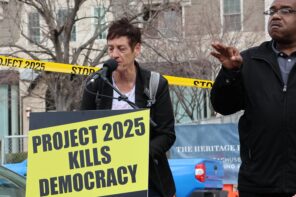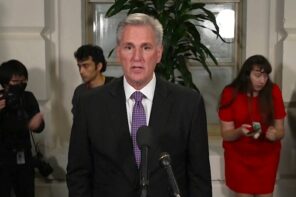Ken Miller has been through the Texas Board of Education’s textbook review process before. Three times in fact.
So, the Brown University biology professor, who co-wrote the popular high school textbook Biology with Joe Levine, said he’s not terribly worried about going through it again. Actually, the new science standards written last year present him with an invitation to delve into the issue of evolution and the fossil record more thoroughly.
But ask him whether he knows how he’d cope with writing a history textbook under the new social studies guidelines, he responds quickly:
“God no!” he said, horrified. “Beats the heck out of me. I really don’t know.”
The 30-day public comment period for the Texas Board of Education’s revised social studies curriculum is underway, and organizations from the American Civil Liberties Union to historians to the Texas Library Association are urging the public to weigh in regarding conservative efforts to rewrite history.
The more than 100 revisions have garnered outrage from educators across the country, which include playing down Thomas Jefferson’s role as an influential thinker, requiring the President of the Confederacy, Jefferson Davis’ inaugural address to be taught alongside the writings of President Abraham Lincoln, and replacing the word “capitalism” with the phrase “free enterprise.”
The curriculum changes are part of the Texas Essential Knowledge standards, which serve as a guideline for publishers and writers hoping to secure the lucrative Texas high school textbook market—the second largest in the country, second only to cash-strapped California.
In addition to rewriting the social studies’ standards, the board last year also made significant changes to the science curriculum, inserting language that raises questions about the validity of evolution and man-made climate change. Fundamentalist Christians on the board fought for and approved creationist and intelligent-design friendly language asking students to analyze the “complexity of the cell” as well as “analyze and evaluate the sufficiency of scientific explanations concerning any data of sudden appearance, stasis and the sequential nature of groups in the fossil records.”
Board member Don McLeroy fought to have the language inserted because he lacks a scientific understanding of how evolution accounts for things like cell complexity and the fossil record. So rather than tiptoe around the questions raised about evolution, Miller views it as an opportunity to embrace the wording and address the issue head-on. “That’s really an invitation,” he said. But whether the strategy will work depends on who will be sitting on the board at the time.
Texas’ textbook review process is like no other. Next year, Miller and other authors and publishers of high school textbooks will gather before the Board of Education in Austin to testify to the fact that their books meet the new standards. The board will then vote whether to reject them or put them on the approved list. After that, individual school districts will select textbooks from that list.
In 2003 and 2004, despite McLeroy’s attempt to reject Biology, it was approved 11-4 and Miller and his co-writer spent 43 days and 43 nights flying around Texas, visiting with local textbook selection committees.
“I spent more time in Texas than George Bush did that year,” Miller said. “I could have registered to vote there.”
Publishers Watching, But Are They Listening?
While the code language in the science standards may be vague enough that perhaps writers like Miller can use them to their advantage, the social studies requirements are another story.
Many warn that as goes Texas, so goes the nation, since publishers writing textbooks to adhere to Texas’ standards would sell the same or similar versions to other states as well. In response, People for the American Way has begun a petition to send to publishers urging them to ignore the new guidelines.
Others, including those who count themselves among the board’s most vehement critics, say the impact on the actual writing of textbooks may not be that dire. Still, that doesn’t spell good news for public education. For no matter what the outcome of the standards on textbooks—either in Texas or across the country—the board is clearly rewriting history to fit a conservative agenda and a Christian-dominated worldview.
Jay Diskey, executive director of the school division of the Association of American Publishers, called the idea that the Texas standards would impact the education of students in other states “an urban myth.”
Diskey said publishers have been customizing separate state editions since 1994 when the federal government required each state to come up with its own separate academic standards. While digital publishing has made it easier to accommodate various editions, even before the mid-’90s, states were asking for textbooks geared to the local history. “Texas might ask for more information on the Alamo; California might ask for more on the Gold Rush,” he said.
Diskey said textbooks have long played a prominent role in the culture war, dating back to the Civil War. “We don’t argue against it,” he said. “That’s a state’s prerogative.”
While Ken Miller acknowledges that publishers are capable of producing different state editions, if they had their druthers, it’s more cost effective to only having to make one version, just with minor tweaks to accommodate state standards.
“Indeed it’s possible to produce a special edition for just Texas, but the reality is that almost all publishers would prefer the same core textbooks,” he said.
Biology has state versions, but where they differ is at the end of the chapter with review questions material. Miller said everything else in the different versions is the same.
Pearson publishes Miller’s Biology. CEO Marjorie Scardino, Miller said, has assured the authors that she would rather be known as the publisher who sold no books in Texas, rather than the one who compromised scientific integrity and failed to stand on principle.
David Hillis, a professor of integrative biology at the University of Texas—Austin who co-wrote the textbooks Life: The Science of Biology and Molecular Systemics said no reputable publisher or writer would kowtow to the board’s standards.
“It’s hard to imagine any publishers taking this seriously,” said Hillis, who testified before the education board last year regarding the science standards. “Are they really going to remove Thomas Jefferson from a discussion of the Enlightenment? And are they really going to substitute ‘free enterprise’ for capitalism? That’s ridiculous. They aren’t even synonyms.”
“Publishers have reputations to maintain and this is so far off the mainstream of what is taught. They’re not going to add pseudoscience to the books. They’re not going to eliminate key historical figures.”
For the most part, publishers of high school textbooks are reluctant to discuss the Texas controversy, even though it’s acknowledged that they have been following it closely.
Sinauer Associates is a small publishing house that publishes college-level science textbooks, some of which are used in high school advanced placement classes. Sinauer, along with W.H. Freeman jointly published Hillis’ Science of Biology and Molecular Systemics. President Andrew Sinauer said his company would never consider inserting anti-evolution language into a textbook to make a sale to creationists.
“We simply wouldn’t do it and our authors wouldn’t tolerate it,” he said.
However, he said that the smaller college textbook market isn’t subject to the same kinds of pressures as the high school publishing houses for which state and regional standards have long required specific editions. So, a company might customize 8,000 copies for Texas, but still sell educationally legitimate copies to the rest of the country.
More Than Just Textbooks
Even though Hillis is less worried about the board’s impact on textbooks, it doesn’t mean he isn’t concerned about what it could do to students’ education.
Under the standards, the board could require use of “supplemental material” as a way to sneak in creationist and intelligent design documents, like the Discovery Institute’s Signature of the Cell, or books that rewrite history from a distorted and dubious Christian perspective, like David Barton’s America’s Godly Heritage.
Other states have tried the supplemental material language, so far unsuccessfully. “But they keep trying,” Hillis said.
Interestingly, the person who led efforts to rewrite the standards won’t be around next year to pick the textbooks. McLeroy, the board’s former chairman and the most vocal conservative on the board, lost his primary race last month.
McLeroy, a young earth creationist and Christian fundamentalist, has argued that his goal is to add balance to the curriculum. “History has already been skewed,“ he said following last month’s vote. “Academia is skewed too far to the left.”
Of course, McLeroy also argues that women and minorities should be thankful to the ruling white male majority for bestowing them with equal rights. (See video here of his statement which begins at about 4:00.)
Three of McLeroy’s fellow conservatives lost their races as well. Randy Rives and Joan Muenzler, who were backed by groups such as WallBuilders and the Texas Pastor Council, also lost their primary races. In addition, Austin attorney Brian Russell, whom board member Cynthia Dunbar recruited to run for her seat, lost his race to a moderate Republican. Dunbar, who is retiring, is a dominionist and has said public education is evil. Another conservative, Ken Mercer, is facing a serious challenge from a pro-education candidate in the fall election.
Next year, just in time for the textbook review, the far-right Christian conservatives may no longer hold a majority. At that point, it will be up to the new board whether it should apply or ignore the standards.
So, if the Texas textbook controversy were to end up having little impact on textbooks either across the country or even in Texas, was it all just a tempest in a teapot?
The answer, Hillis says, is no.
Unfortunately, young inexperienced teachers in small districts will look to the curriculum standards for guidance. And while teaching creationism is illegal, someone would have to be willing to challenge it.
“Clearly this is part of an effort to generate a culture war,” Hillis said.
Dan Quinn, a spokesman for the watchdog group Texas Freedom Network, points out that Texas in the next 10 years could become like Kansas; in response to Kansas’ board of education’s decision in the late 90s to eliminate evolution from its standards, voters elected a pro-science board. In the next election, voters elected a creationist board and then back to a pro-science board. “It became like educational schizophrenia,” Quinn said, “where teachers didn’t know what to teach from year to year.”
The amended standards, which will be reviewed and voted on May 19-21, are now available at the Texas Education Agency Web site. The Texas Freedom Network has a pretty comprehensive list as well. In no particular order, here is a list of 10 of the most egregious changes to the social studies curriculum:
1. Exceptionally Unjust: Conservative board members spent much time stressing that students need to learn about “American exceptionalism,” even as they removed the concepts of “justice” and “responsibility for the common good” from a list of characteristics of good citizenship for Grades 1-3. They also unsuccessfully tried to remove the word “equality.”
2. Disestablishing the Establishment Clause: A proposal suggesting that high school students be able to “examine the reasons the Founding Fathers protected religious freedom in America by barring government from promoting or disfavoring any particular religion over all others,” was rejected by religious conservatives.
3. The Enlightenment Ends Here: Board members voted to remove Thomas Jefferson from a world history standard about the influence of Enlightenment thinkers on political revolutions from the 1700s to today. Instead, they replaced him with theologians Thomas Aquinas and John Calvin. Then, because neither were Enlightenment thinkers, board members also removed the word “Enlightenment.”
4. A Free Substitute for Capitalism: Board conservatives banned the word “capitalism” from the standards, arguing that “liberal professors in academia” use the word in a negative way. The phrase “free enterprise” is to be used in its place.
5. McCarthy, Great American Hero: Led by McLeroy, board members voted to require students to learn about “communist infiltration” in the 1950s in an attempt to absolve Joseph McCarthy for his Cold War Communist witch hunts. McLeroy asserted inaccurately that McCarthy has been “vindicated by history.”
6. Expunge the (Brown) Socialist: The board took Dolores Huerta, co-founder of United Farm Workers of America, from a Grade 3 list of “historical and contemporary figures who have exemplified good citizenship” because she was a socialist. Inexplicably, socialist Helen Keller remained on the same list.
7. A Hero Ain’t Nothin’ But a Conservative: Students are required to learn about “conservative heroes and icons” like Phyllis Schlafly, the Heritage Foundation and the Moral Majority. No similar standard is required for “liberal heroes and icons.”
8. History, Rewritten by the Losers: When studying the writings of President Abraham Lincoln, 8th-grade students are also required learn about Jefferson Davis’ inaugural address as president of the Confederacy during the Civil War in their US history class.
9. Declaring Culture War on Liberal Programs: Students are required to learn about “any unintended consequences” of the Great Society, affirmative action, and Title IX.
10. As Goes Hollywood So Goes the Texas School Board: The board removed freedom fighter and Salvadoran archbishop Oscar Romero, who was assassinated during Mass, from a standard about leaders who resisted political oppression. The reason? Because they hadn’t heard of him and, as one board member said, “he didn’t have his own movie” like Nelson Mandela and Mohandas Gandhi.




